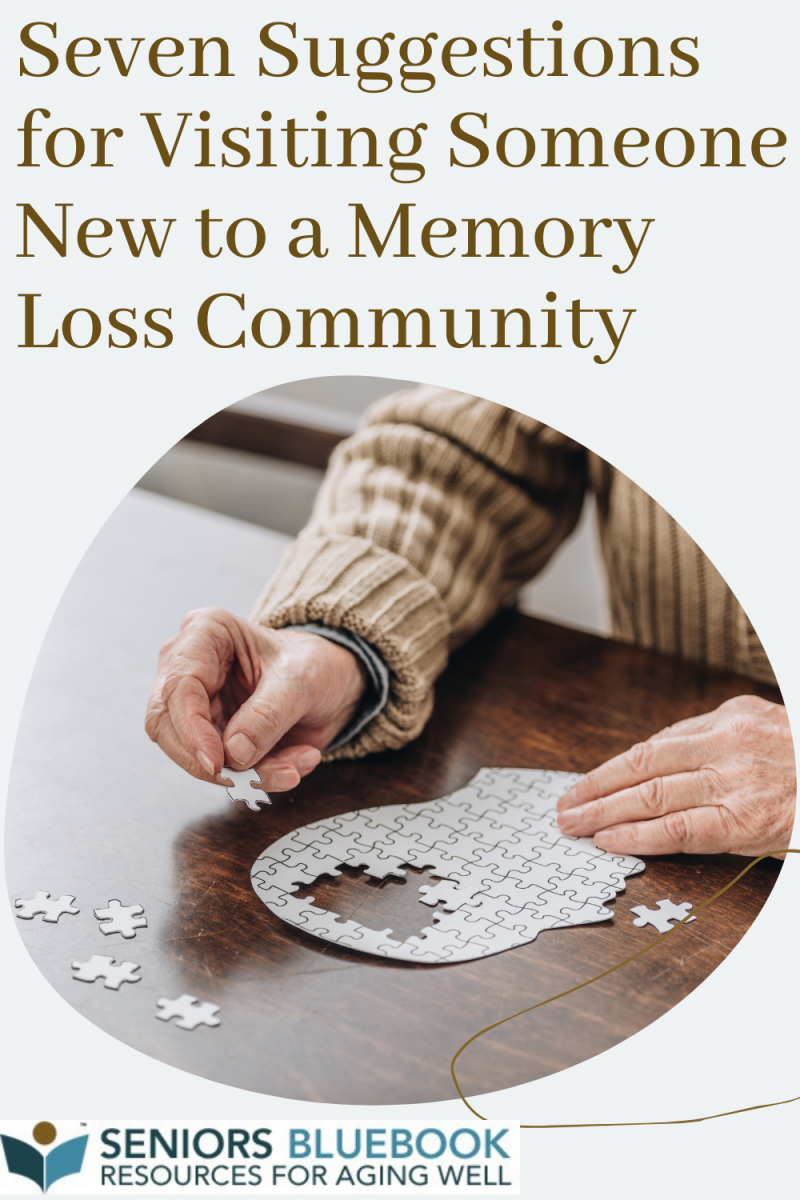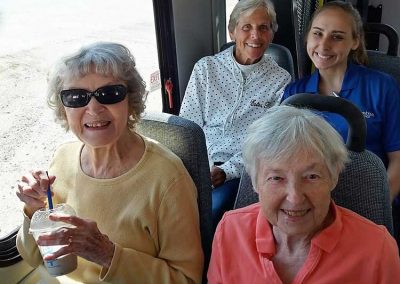Seven Suggestions for Visiting Someone New to a Memory Loss Community
CountryHouse at 70th & O
Oct 05, 2021
Nebraska - Eastern Region
Read and write letters. To further assist individuals adjusting to their new home, ask friends or family members to send letters, cards and other correspondence. You can also help your loved one send letters and cards to grandchildren, friends and others.
Keep up with current events. Read the local newspaper, a magazine article or talk about current events. Keep the topics lighthearted and positive.
Join resident activities. Whether its enjoying a sing-a-long, watching a movie, or going on an outing, join your loved one in experiencing life at the community. We guarantee youll smile.
Reminisce about the good old days. Everyone loves stories. Talking about past holidays, fun times growing up, or past experiences can be fun, and can trigger good memories. Just avoid putting someone with memory loss on the spot. Avoid asking, Do you remember? Just tell the story. They may even surprise you and join in!
Embrace the silence. Dont feel like you need to talk the entire time. You may even consider bringing things to work on while you visit, such as knitting, or a book to read. You may even know some of their favorite activities and bring something you can enjoy together such as a puzzle, crochet project or their favorite movie.
Bring in their favorite treat or meal. Does Aunt Penny love pretzels? Is Grandpa crazy for chocolate chip cookies? Bringing their favorite treat will surely bring a smile to their face and yours!
Help decorate their room. Bring their favorite items from home and add to the familiarity of the space. If its close to a holiday, bring decorations to mark the occasion.
All are opportunities to create a moment of joy for your friend or loved one and make their day more special. Remember: Agemark staff are here to help. If you need suggestions, want advice, or simply need support, please ask. Were here for you!
Other Articles You May Like
Top 5 Questions A Certified Medicaid Planner Encounters: Insights for Healthcare Pros and Caregivers
Hello, allow us to introduce ourselves! We are Beneficent, and we provide trustworthy long-term care guidance for deeply caring family members facing a critical long-term care financial crisis.Beneficent helps clients understand, prepare, and qualify for programs covering high costs of Long-term Care including assisted living, adult day care, home care, or skilled nursing homes for seniors and disabled adults.As Certified Medicaid Planers Read our Top 5 questions we hear most.Must I spend down to $2,000 to apply for long-term care Medicaid? No, reducing your assets to $2,000 is not the only route to qualify for Long-term Care Medicaid if your income exceeds the limits. By leveraging legal strategies within Medicaid regulations, we can assist in navigating the income requirements.For 2024, a single applicant is expected to have a resource limit of $2,000, while the limit for a married applicant is about $150,000 If I accept Medicaid assistance will I lose my home?Once a Medicaid recipient passes, the state may seek reimbursement of the amount they paid for in long-term care costs. However, proper planning can protect a home and other assets from a Medicaid claim.I have been told I make too much money to qualify for Long-term Care Medicaid?The best way to figure out your best options is to schedule your first free initial consultation with Beneficent on our home page. (www.doinggoodforothers.com)During that time, we'll review and evaluate your assets to determine if we can help you qualify for a long-term plan4. Is Medicaid Planning legal and ethical?Proper Medicaid planning is legal and ethical and it works to ensure that all rules and regulations are followed.Medicaid planning seeks out effective methods of securing eligibility while preserving assets for the future benefit of the applicant and the applicants loved ones5. Should I apply for Medicaid or VA Aid + Attandance on my own?We appreciate your determination to tackle the application process independently. However, it's important to note that many individuals find themselves facing denials due to the complexity of the process.To support you, we offer a complimentary 1-hour consultation where we share our expertise on how to file for and qualify for these benefitscompletely free of charge.If you feel prepared to dedicate the significant amount of time required and are ready to manage the intricate details involved, we are more than willing to equip you with all the necessary information. Our goal is to ensure that you are informed and confident in whichever path you choose to take, whether it's proceeding on your own or seeking further assistance. Remember, our guidance during the consultation is meant to empower you with knowledge, but navigating the process can still be a challenging endeavor. Call us to schedule an appointment. 719.645.8350 - OR - read more of our FAQs on our website. www.doinggoodforothers.com/faqs
The Top 5 Misconceptions about Long-term Care Medicaid Eligibility
What You Have HeardAsk yourself, was the info you heard from a Certified Medicaid Planner?Medicaid Misconception #1 - You can only have $2,000.FACTSSingle applicants have a resource limit of $2,000. (in 2024) A married applicant has a resource limit of about $150,000. (in 2024)Medicaid Misconception #2 - Your home will be taken from you if you are on Medicaid.FACTSAll applicants are allowed to have 1 home and 1 car. There are ways to avoid Medicaid estate recovery, an applicant can receive Medicaid and keep their home.Medicaid Misconception #3 - You make too much money.FACTS If you are over the income limit, Beneficent can provide the legal steps using the Medicaid code to bypass being over the income limit.Medicaid Misconception #4 - You must spend down to $2,000 to qualify for Medicaid.FACTSThis is an option, however not your only option. If you want to preserve the hard-earned assets you or your loved one has worked their entire life, you can!Medicaid Misconception #5 - Why doesnt everyone apply for Long-term Care Medicaid if the other outcome statements are true?FACTSMany are deceived by misinformation and preconceived notions. There's a game-changer you need to know about - Certified Medicaid Planners (CMP) - we know the rules and regulations.You can find all the CMPs in the United States here, (https://cmpboard.org/locate-a-cmp/) there arent too many of us! Need to schedule an appointment with one of our Certified Medicaid Planners at Beneficent? Book here (https://calendly.com/doinggoodforothers) or call our office (719.645.8350) for more appointment times.
Navigating the Conversation
Navigating The ConversationWhen is the perfect time for important family discussions about Assisted Living or Memory Care?As our parents age, it becomes increasingly crucial to address their changing needs and make decisions about their care. Making a decision to move to an assisted living or memory care residence is a big deal. Thats why weve put together some helpful tips to help your family manage these difficult conversations.Lets explore how to approach the subject of aging parents with your siblings.Follow these tips: Set the Stage: Choose the right moment to bring up the topic. A family gathering can be busy, so select a time when everyone is relaxed and not distracted by preparations or activities. You might want to consider scheduling a specific time to have this conversation to ensure everyone is present and focused. Agree on an Agenda: Before the discussion, collaborate with your siblings to outline what you want to cover. Having a clear agenda will help keep the conversation on track and prevent it from veering into unrelated issues or becoming too emotional. Express Your Concerns: Start the conversation by expressing your concerns and the reasons for bringing up the topic. Mention any recent incidents or observations that have prompted this discussion. Its important to frame the conversation in terms of love and care for your parents well-being. Listen Actively: Encourage your siblings to share their thoughts and concerns. Actively listen to what each person has to say and be open to different viewpoints. Remember that each family member may have a unique perspective on your parents needs and what they want. Share Information: Ensure everyone is well-informed about your parents current health, financial situation, and any existing care arrangements. The more information everyone has, the better the decisions you can make collectively. Discuss Options: Explore various care options, such as aging in place with in-home care, assisted living, or nursing homes. Be open to discussing what your parents want and what aligns with their preferences and values. Delegate Roles: Assign specific responsibilities to each sibling. For instance, one sibling could be in charge of researching different care facilities, while another might focus on financial planning and insurance. Delegating tasks ensures that the process is efficient and organized. Respect Differences: Understand that not all siblings may agree on the best course of action. There may be differences of opinion, but its important to respect each others perspectives and find compromises. You can seek input from a professional mediator or counselor if the disagreements become too challenging to manage. Involve Your Parents: Whenever possible, include your parents in the conversation. Their input is crucial in making decisions about their care. They may have preferences or concerns that should be considered. Revisit the Conversation: This initial discussion is just the beginning. Continue to have open and honest conversations with your siblings and plant the seed for discussion. Regular check-ins can help ensure that everyone is on the same page and that plans remain relevant to your parents evolving needs. Celebrate Together: After having the discussion, remember to celebrate and make memories together. Enjoy your family time and strengthen your bonds. While caring for aging parents is a significant responsibility, its also a time to cherish your family connections. Seek Professional Guidance: If your parents situation is particularly complex or contentious, consider involving a professional, such as an elder care attorney or a geriatric care manager, to provide expert advice and guidance. Approaching the topic of assisted living and memory care with aging parents and your siblings may not be easy, but its a necessary step in ensuring the well-being of your loved ones. By following these tips, you can foster a supportive and collaborative family environment where everyone works together to make the best decisions for your aging parents. Ultimately, this approach will lead to greater peace of mind for everyone involved. Remember, you are not alone on this journey. If you ever find yourself in need of expert guidance, support, or additional resources to assist with aging parent care decisions, the team at Proveer at Port City Assisted Living and Memory Care is here for you. Conveniently located in Mobile, Alabama near shopping and restaurants. Our mission is to provide the assistance and information you need to make informed choices about the well-being of your loved ones. Ultimately, we are here to provide PEACE OF MIND and that is priceless. Contact Proveer Port City at 251-380-0053.
Local Services By This Author
CountryHouse at 70th & O
Memory Care 240 South 70th Street, Lincoln, Nebraska, 68510Devoted exclusively to benefiting those living with Alzheimers disease and related dementias, CountryHouse residence for memory care is not typical memory care. Were all about experiences. Do more. Engage more. Live more. Walk into any CountryHouse community and see residents engaging with one another. See families enjoying dinner together grandchildren included. See bowling and badminton on the lawn, budding artists in the art studio, chefs baking in the kitchen and smiles throughout the community. At CountryHouse, we provide the uplifting, engaging and meaningful lifestyles and care people with memory loss need and their families want. Days are filled with joyful moments to ensure our residents still have opportunities to lead enriching lives, filled with the happiness simple pleasures can bring.

